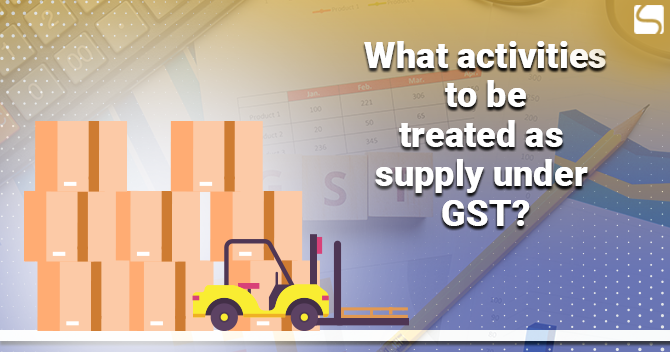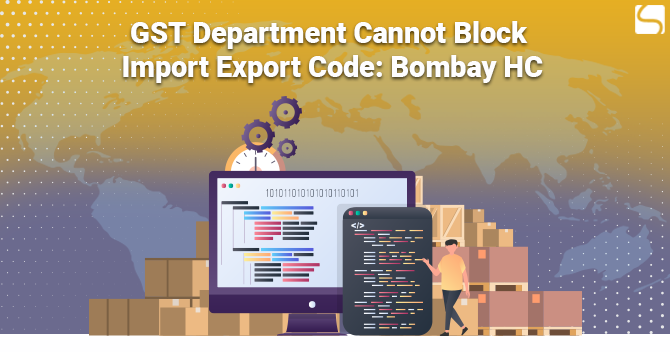What Activities to be Treated as Supply under GST?

Japsanjam Kaur Wadhera | Updated: Jan 07, 2021 | Category: GST
GST means Goods and Service Tax. The Transactions between related persons and other such activities is Treated as “Supply” under GST even if it is made without consideration. GST is relevant or will apply on these transactions. It is listed in Schedule I of Central Goods and Services Tax 2017 (CGST) Act. The transactions are done between parties which are relation or between a principal and an agent. Parties pay GST and later can claim it as input tax credit. This article will provide you with information relating to what activities to be treated as supply under GST.
Table of Contents
What is Supply under GST?
A taxable event for charging tax is considered as supply under GST. The liability to pay the tax arises at the time of supply of goods and services. It is necessary to decide the applicability of GST to determine whether a transaction falls or comes under the meaning of supply or not.
Supply of Goods and Services before GST
Under the old Indirect Tax Regime, there was no specification of supply of goods and services. The stage at which indirect tax were levied were wide ranging under different laws. The excise duty was charged on the goods that were produced when they were taken out of the workshop. Service tax was imposed based on rules known as “point of taxation” rules, for reduced services. Vat was imposed on the value of the sale of goods and the provision of services.
However, now the present system merged and combined all the taxes to maintain a single tax know as Goods and Service Tax Registration (GST).
Transactions between related persons
Since the pricing methodologies for the transactions between related persons are challenging along with the manner in which to arrive at it, the transactions between related parties are notably important under any law. In the circumstances where the persons are related, the prices are controlled and would not sometimes be prices that would have been charged in circumstances where the transactions are done between unrelated persons.
Let us now understand that when activities to be treated as supply under GST will be taxable then how to treat transactions between related persons and how to calculate under GST laws. The definition of related persons is stated under section 2(84) of the Goods and Service Tax Act (GST).
Related Person under GST
The persons shall be deemed to be related if they fall under any of the categories below: –
- An employee or an employer.
- Director/ Officer of one business is also the director/ officer of another business.
- The businesses are recognised as partners of the firm legally.
- A person holding at least 25% of the shares in another company either indirectly or directly.
- One of the persons controls the activity of the other indirectly or directly.
- The related persons are under common management or control.
- The entities together control another entity.
- The related persons are members of the same family.
A person means a legal person who can be a company, firm, individuals, Hindu Undivided Family[1] (HUF), cooperative society, local authority, LLP, government etc or an artificial juridical person. It also includes the entities incorporated outside India.
The persons who are associated with one another’s business or is a sole concessionaire or sole distributor or sole agent shall be deemed to be related.
What is the Taxability of Supply made between related persons?
The supply between the related persons with consideration shall constitute as “supply” like any other transaction. However, supply made between related persons for no consideration or inadequate consideration comes under Schedule I of the Goods and Services Tax Act (GST). And such transactions shall be considered as “supply” only if takes place in course of furtherance of business.
Also, when the import of service from an establishment or a related person outside India is done by an entity for the furtherance of business, it shall be treated as supply.
Exception: Relief is given in a case where an employee is gifted something by an employer and the value of the gift is less than Rs. 50,000. This shall not be considered as supply.
Transactions Valuation between related persons
The value of supply between the related persons other than where the supply is made through an agent is determined as below: –
- Open Market valuation of supply- it is the value of supply between the two entities which are not related. When a supply is between the entities which are related, there is a much possibility that the prices will be influenced by their relationship.
Example: – goods are sold by “A” Ltd to “B” Ltd which are related entities at Rs. 1000 and to “C” Ltd which is an unrelated entity, the goods are sold for Rs. 1500. In such a case, it can clearly be seen that the relationship has influenced the pricing of “A” Ltd. And therefore, the purpose of valuation, Rs. 1500 will be considered.
- If the open market value cannot be determined, then the value of goods of like quality and kind shall be considered.
Example: – If sales were made by “A” Ltd to “B” Ltd, then the above valuation method would not be appropriate. Then, the “D” Ltd would be considered, who sells similar goods as “A” Ltd at Rs. 1200. Therefore, the valuation for this purpose would be Rs. 1200.
- If no appropriate value is given by both the above methods, then value based on cost of production or cost or under the residual method will be considered.
Goods Supplied via Agent
- To the agent by his principal and the agent will supply them on behalf of the principal.
- To the principal by his agent when the goods are received by the agent on behalf of the principal.
The supplies between the principal and agent shall be liable to GST. Both of them will be liable to pay GST severally and jointly. The person paying the GST can claim input tax credit later.
The value of supply to an agent is also based on the above provisions in for related persons.
Services Imported from a related person by a Taxable Person
Importing of services by a taxable person from a related person or from any of his other establishments which are outside India, for the purpose of business will be considered as supply.
Example: – “A” Ltd has incorporated ABC Inc. in the US, along with “B” Ltd in India. Services are from ABC Inc. By “B” Ltd without any consideration, the import will be deemed to be a supply. The “B” Ltd shall pay GST on reverse charge basis.
Permanent Transfer of Business Assets where Input Tax Credit has been utilized on such assets
The sale of business assets or permanent transfer on which input tax credit has been utilized will also be considered as supply even if there is no consideration received. The Goods and Service Tax (GST) will be applicable to the sale of business assets only. It is not applicable to the sale of personal building/ land and other person assets.
The “Permanent Transfer” means the transfer of goods without any intention of receiving the goods back. Goods sent for certification/ testing or sent on job work will not be considered or qualify as supply as there is no permanent transfer of goods.
Scrapping or disposal or donation of business assets in any other manner other than as a sale – that is, for a consideration, would also be considered or qualify as “Supply” where input tax credit has been claimed.
Conclusion
The supply under Goods and Service Tax (GST) is considered as a taxable event for charging tax. The liability to pay the tax arises at the time of supply of goods and services. The information regarding what activities to be treated as supply under GST has been explained in the above article. It deals with the transactions between related persons and other such activities to be treated as supply under GST. Hence, to decide whether the transaction falls under the meaning of supply or not, it is necessary to decide the applicability of the GST.
Also, Read: GST Department Cannot Block Import Export Code: Bombay HC














